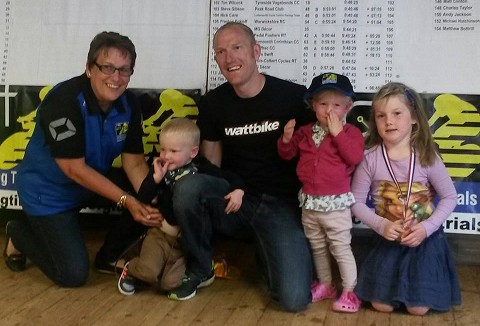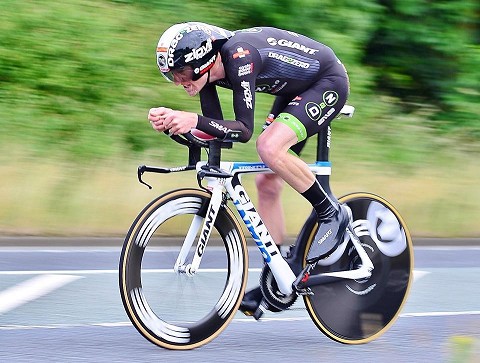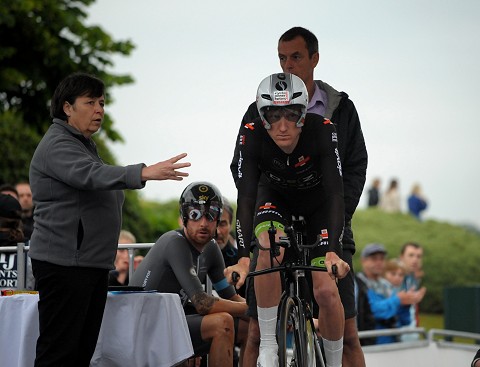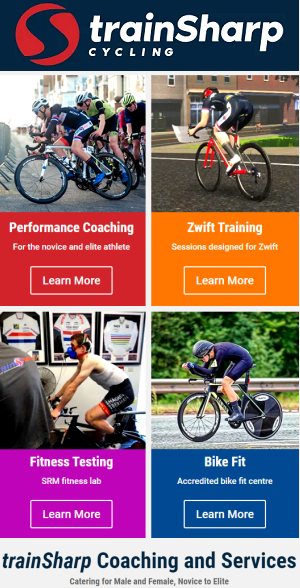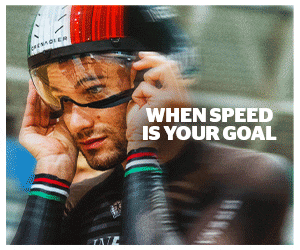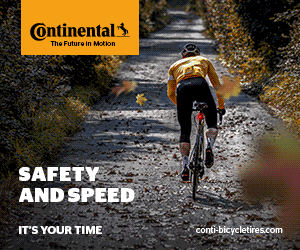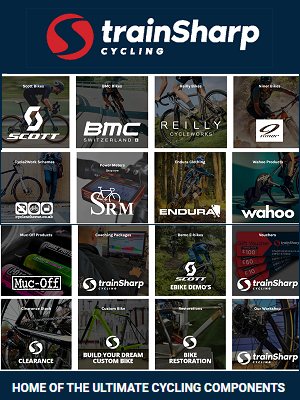VeloUK talks training with Matt Bottrill who admits he averages only eight hours a week adding its quality over quantity
 |
Matt Bottrill – Quality over Quantity
Matt Bottrill (drag2zero.com) kicked off the 2015 season in fine form in the 20 mile Kettering Hilly last weekend beating some quality testers in the process. Matt, who is developing his own coaching business, was keen to show that the speed on the bike he had in 2014 was still there.
“I’ve trained hard this winter as after all these years of racing, I still get nervous. I guess it’s the fear of defeat that spurs me on! But myself and Bob Tobin (Cyclepowermeters.com) always love new ways of training to find new gains through training methods so we trained in a totally different wayâ€.
“Believe me, it’s been hard but that what’s makes a champion, always setting new goals and limits. And I have never been more motivated to smashing it up!â€
Matt not only has a job and a business to run but also a young family so time for training is limited!
Without doubt the best domestic time triallist in 2014, Matt broke long standing records and won blue ribbon championships whilst still working full time. With less than ten hours a week to spare, Matt has swapped hours on the bike for quality sessions that has helped him achieve record speeds.
There is a phrase in cycling, ‘don’t leave it on the road’ in reference to those that in training don’t have anything left for racing. But more and more, we hear top riders like Lizzie Armitstead and Matt Bottrill speak about how hard they train with the proper rest so they can race effectively as well.
Matt has been racing for so long, he admits he has had so many failings that he has learnt from them to know what works for him. “It’s why I can relate to people when they tell me their stories and I can say, I’ve done that so let’s do thisâ€.
Many a cyclist will look to doing the hours on the bike but whilst that has its place, for some one like Matt, time on the bike is limited so he has to make the most of it.
“I average eight hours a week but when it comes to a key race, I’ll up that to ten hours a week†says Matt. “I don’t think people realise how hard I train. Some times, I’ll go out and average 25/26 mph. I’ve just done an hour on the Watt bike and average 27 mph. That is the keyâ€.
Asked what a typical week would be for the champion tester, Matt replies “It s hard to give a typical week , because there is not one. I train different all the time but generally have two days off a week, normally Wednesday’s and Sunday. In the winter, 60% of my time is on the Wattbike bike and the most of everything else I do is on my training TTÂ bike. It’s very rare I train under 20 mph. Summer, 80% on the road 20% on the Wattbike.
“The biggest downfall that riders have is that they use too much time at the wrong time. They train really hard in the winter and then they’ll come to racing and they will run out of hours. If you are working, there are only so many hours so there will be always be an optimal amount of time you have to train.â€
“I always say to any rider, if you want improvements, then you need variety! So if you keep training in the same way or keep getting repeated training, I can tell you’re not even close to hitting your full potential.â€
Asked if he trains every day, Matt replies “no. At the minute, I’ll have a couple of days off. The most I will ever do is two and half hours as it’s impossible to do any more.â€
Having days off though is hard for many riders as they get the ‘guilt trip’ thinking I need to be training but Matt admits he never feels guilty having a day off. “I know the training I do is calculated. You know when you are going to peak, and I know how much training stress I can take and it’s taken years to get to this stage but you can optimise everything. There is no guess work in any of itâ€.
Finally, on the efforts he does in training, what’s a gruesome one I asked? “Simple” Matt replied. “Intervals to failure where you keep riding until you cant hold the power anymore. When I trained for the National 10 last year, I went so deep, I could hardly turn the pedals by the last interval. But to be honest, when I’m focused on really hurting myself, I can do this quite a lot”.
A very special image – Matt prepares to start in the British Time Trial Championship, as Bradley Wiggins, World Champion in 2014, watches.
RACE DAY WARMUPS
Moving on to race day and his warm up for races, I asked Matt does it vary from race to race depending on terrain or distance? “I have tried so many different warmups after looking at what the Sky riders and others do and I have found it hardly makes any difference in what warm up I doâ€.
“If I want to race, and the head has that mind-set, then the warm up has made no difference to me personally. Everyone is different, so it’s about looking at what a specific rider needs.â€
So do Matt’s warmups differ to those of the riders he coaches? “You do try different things with riders to find the one that works where with me, I have found over the years I have done so much, it doesn’t make any difference. A lot of it is psychological. You know if you are in that mind-set, it gives you the belief you are going to do it and go faster. That is the biggest part of it. It’s mentally that what most riders fail on.â€
Matt has been racing for a long time and was accomplished on the road as well with wins in the Severn Bridge RR and the Eddie Soens memorial to name but two.
“If you know you have trained right, you have your position right, you know how to pace the race, then you should be able to get on the bike and say to yourself, this is my time, I have done everything to get the best out of myself. Then after, you can look back at the data and say ‘I have got everything out’.â€
“I did the same warm up last year to the other years but then I guess I have the confidence to do that. I’m not saying that is right for everybody. There is no difference to how I warm up when I was a junior to where I am now. I try different things but I haven’t found it makes much difference.â€
Asked if he has learnt from coaching other riders things he can apply to his own riding, Matt says “oh yes. I am learning from people all the time. I love it when a rider comes back to me and says I don’t think this is working and you can look at it and say, okay, let’s try this.â€
“Not everybody is me. So you have to break down what their lifestyle is and what they are aiming for and their goals and work back from that. That’s what most riders and coaches don’t realise, it’s never one key element that will bring you success it’s a combination of everything and striking that fine balance, between lifestyle and trainingâ€.

Being aero is just one of the things that Matt and his team are keen on and for that he calls on Drag2Zero wind tunnel
Six tips from Matt to going faster:
1. GOALS: Set out what you are trying to achieve. IE, set your goals. Make these realistic, but also aim high! Don’t let others bring you down! Riders will always try and play mind games. Always focus the goal your aiming towards and not other riders. The goal should be distance, placing or time specific – not beating a rider!
2. TIME: Set out the time you will have available and this is where most riders will fail because they don’t account for work and how much stress that puts on the body and also their family life. This is when a good coach comes into play as they can hold you back or push if needed.
3. TRAINING: Once you know how much time, it’s about making the training quality over quantity. Don’t be afraid of failing as that is part of the learning process. You need to learn from mistakes e.g if you blew on a training session, write down what you ate and drank before and during. There’s so much you can analyse. Learning from mistakes is progression itself.
4. STEPPING STONES: To get to your goal you have to have stepping stones and rewards. So set benchmarks along the way. Events and races can keep you motivated in the short term and progress to the overall aim you are looking to achieve.
5. THE BIKE: Look at every aspect of the bike setup. You have to optimise everything, your bike to match the way you optimise your training and also optimise the pacing in your race. If you do all of that, you are only going to get faster.
6. REST & RECOVERY. This is the bit that most people neglect. They need to allow for days off. If you have the optimal training plan for what you are aiming for, then you should not feel guilty resting. You should learn to enjoy it.
Further information from Matt and his coaching
Other Links remixing limited time for training : Matt’s blog on the Giant website
Training Over Racing?
Send your results as well as club, team & event news here
Other Results on VeloUK (including reports containing results)
- Features, Reports, Results
- Result: Beverley Town Centre Races
- Hill Climb Championships: Change of Course
- Crit Result: Portsmouth Evening Circuits 11
- Crit Result: RCR FatCreations Goodwood Summer Special
- UK Armed Forces Inter-services Road Race
- Report: TLI Cycling ‘Belgium Training Series
- BMCR RESULT: The Ron Day MK Bowl Circuit races (July 23rd)
- RR Result: Bath RC Junior National Series Road Race
- Crit Result: West Thames League 15
- Crit Result: SACA Salt Ayre Tuesday Series 15
- Crit Result: Bath CC Mid Summer Series 2
- Crit Result: Full Gas Summer Circuit Series #17
- TT Result: Ross-On-Wye & Dist CC 25m TT
- TT Result: Ross-On-Wye & Dist CC 10m TT
- TT Result: Kernow Racing Team 10m TT
- News: Men’s Tour of Britain Route (Stage 1 & 2)
- Youth Result: RL360 Isle of Man Youth League 14
- TT Result: Verulam Cycling Club 25m TT
- TT Result: Manchester & District Ladies CA 25m TT
- TT Result: Ferryhill Wheelers CC 25m TT
- Crit Result: Banbury Star Crit Series #2
- RR Result: Lakes Road Club Summer Road Race
- National Circuit Series: Colne
- TT Result: Kings Lynn CC 15m TT
- TT Result: ECCA 10 mile Time Trial
- TT Result: Chorley Cycling Club 10m TT
- TT Result: Houghton CC 25m TT
- TT Result: Bournemouth Jubilee Wheelers 10m TT
- TT Result: Farnham RC 10m TT
- Crit Result: King&Queen of the Bowl Series #13
- TT Result: Kernow Racing Team 10m TT
- Crit Result: Lichfield/Velospeed No Frills at Curborough #7
- TT Result: Swindon RC & Swindon Wh 50m TT
- Crit News: Spatzwear Friday Night Crit Series #6 | YBC
- GB News: Paracycling Squad for Paris 2024
- Crit Result: Thanks Crit it’s Friday 7
- Crit Result: Omega Portsmouth Circuits 6
- Result: BMCR National Road Bike TT Championship
- Crit Result: Ride Revolution Coaching Summer Crits #2
- Crit Result: Shutt Velo Rapide Hitters Crits Rd2
Other News on VeloUK
- Hill Climb Championships: Change of Course
- TT Result: Ross-On-Wye & Dist CC 25m TT
- News: Men’s Tour of Britain Route (Stage 1 & 2)
- GB News: Paracycling Squad for Paris 2024
- Ribble Redefines Road with launch of Allroad
- BMCR: National Road Bike Time Trial Championship
- SUNDAY: Bath Road Club Junior National Series Road Race
- TLI CYCLING FEATURE: SUPER4SERIES
- NATIONAL CIRCUIT SERIES UPDATE 2024
- News: Josh Tarling Extends Contract at Ineos
- Tour of Britain for Men 2024
- News: Connor Swift Extends Contract with Ineos
- Updated GB Olympic Team News
- Sunday: 2024 Youth Circuit Race Championships (Cyclopark)
- ROBBED BY THE HIGHWAYS AGENCY – National Highways
- Startlist: BMCR National Road Championships E/F/G/H
- OLYMPIC NEWS – Team GB Announces First Riders for Olympics
- News: Alex Richardson Retires
- New Releases from Shutt Velo Rapide
- STARTLIST: Men’s British Road Race Championships
- STARTLIST: 2024 Women’s British Road Race Championships
- Startlist: 2024 CAMS Yorkshire Classic Road Races
- Startlists: 2024 Circuit Race Championships
- Startlist: CAMS Ronde van Wymeswold
- Startlists & 2023 Results: National Time Trial Championships
- NEWS: Star Studded Line Up for National Road Champs
- Riders so far: London Dynamo Summer Road Races
- Women’s Tour of Britain Startlist (provisional)
- News: Lincoln winner hit by car
- Entries Wanted: Ilkley Cycles Races
- GB Team Named for Women’s Tour of Britain
- STARTLISTS: NW, Yorkshire & NE Regional RR Championships
- Startlists: East Midlands Road Race Championships
- News: Ribble Rebellion Race USA’s Armed Forces Cycling Classic
- TT Result: Legato Racing Team 10m TT
- Pre-Race Rider Quotes: Ford RideLondon Classique
- STARTLIST: Witham Wheelers Road Races
- Team News: Tour of Britain for Alba Development RT
- Startlist: Totnes Vire 2024
- Starters: NW Junior/U23 360cycling Two Day






